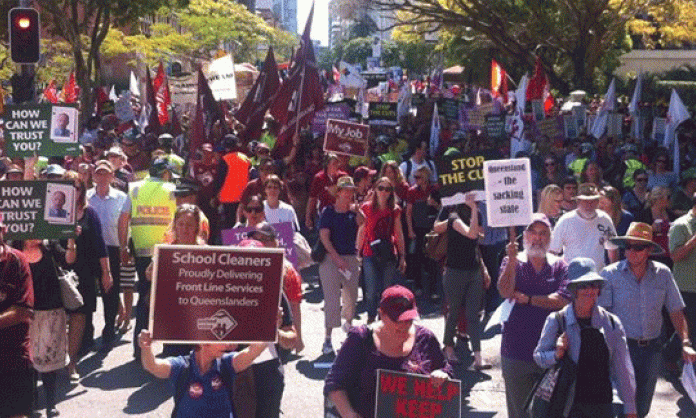When the news came through that Annastacia Palaszczuk would seek permission from the Queensland governor to form government 10 days after the dramatic state election on 31 January, the Electrical Trades Union tweeted: “And the cloud starts to lift from over Queensland after three years of doom and gloom.”
The ETU is not alone in having breathed a big sigh of relief after the defeat of the Newman government.
Whether it was school cleaners threatened with privatisation, public servants, teachers and health workers suffering mass sackings and attacks on working conditions, environmentalists fighting to save the Great Barrier Reef or civil libertarians battling to prevent a return to the dark days of the Joh Bjelke-Petersen government, many people across the state have celebrated the fall of the Newman administration.
Not so happy were the state’s business chiefs, who had strongly backed Newman. They whinged that their “reform agenda” had been “drastically set back”.
Labor’s victory was not, however, a vote of confidence in the party. Although it has come back from a near-death experience in 2012, it recorded a primary vote of just 38 percent this time around – its third lowest in a century. It will be able to form a minority government only because it garnered a strong flow of Greens preferences.
That Labor fails to inspire people is no surprise. Other than scrapping Newman’s privatisation plans, Labor offered little during the campaign: a few extra teachers and nurses, some minor changes to parliamentary accountability, some tweaks to industrial legislation and environmental safeguards and a few token training programs with no offer of work at the end of them.
It offered no promises to reinstate the thousands of public sector workers sacked by Newman. No taking privatised assets back into public hands. No expansion of public housing and transport. Labor may soften the rhetoric, but it is equally committed to the “law and order” agenda of the Newman government: 300 more police will be appointed and an earlier commitment to scrap the “anti-bikie” laws has been withdrawn.
While the bosses were disappointed with Newman’s defeat, they have nothing to fear from Labor. It is not just that before their conversion to the benefits of public ownership while in opposition, several ministers in the new government, Palaszczuk included, had been ministers in the Bligh government, which undertook a $15 billion program of asset sales.
Labor has gone out of its way to reassure business of its right wing credentials. Contrasting what he called the “poor treatment” meted out to business by the LNP, party secretary Evan Moorhead said that Labor would “provide the business community with the assurance that we want to work side by side with them”.
Privatisation is just one part of the neoliberal arsenal. The ALP is committed to pretty much the rest of it. It promised to pay down the state debt and keep taxes low. It is happy to help the coal and coal seam gas industries as they wreak destruction on the environment.
Working class Queenslanders don’t need neoliberalism-lite, but a sharp change of course. Unemployment in suburban Brisbane and some of the regions is as high as 20 percent, more again for young people. Public and community services that were shredded by Newman are limping along at best – if they have even survived. Homelessness is common and the poverty rate is climbing.
There is little chance that a Palaszczuk government will do anything about this. The collapse in commodity prices is already hurting the state budget and will put pressure on the incoming government to tighten the purse strings further. Palaszczuk may have thanked the unions on election night for their help in getting Labor elected, but unions can expect no favours from her in government.
Under Labor, as with the LNP, Queensland workers will get only what they fight for.





